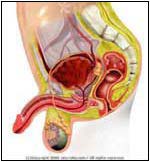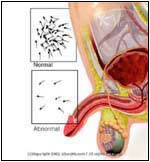|
|
 |

Normal |

Abnormal |
|
|
- Infertility is defined as the failure of a couple to achieve a pregnancy after at least 1 year of frequent unprotected intercourse. Male factors are responsible for 25 to 30% of the cases of infertility, while females are responsible for 30 to 35%, and the rest are attributed to both sexes.
|
 |
- Pain in the case of torsion or infection, but otherwise, symptoms may be absent or a result of the underlying disease. The only sign may be the failure to initiate pregnancy.
|
 |
- The majority of cases are due to disorders of the testicles, congenital diseases, and defects at birth (such as chromosomal and gene abnormalities, or a blockage of the tubes that carry sperm).
- Acquired defects -- infections such as Mumps affect the testis.
- Injuries such as torsion of the testis (twisting of the testis around its cord)
- Radiation injury
- Toxins (i.e., alcohol, insecticides, certain metals, certain medical and recreational drugs
- Immunological diseases such as Insulin- dependent diabetes
- Diseases such as kidney failure, liver diseases, sickle cell disease, and AIDS
|
 |
- History and a complete physical
exam (body and testicles) are the first steps, along with
the following tests:
- Semen analysis (the number,
condition, motility, and function of the sperm)
-
Hormonal analysis
(specifically the sex hormones such as
testosterone)
-
Blood and urine
analysis
-
Ultrasound (using sound waves to see inside the testes and the cord) Needle biopsy of testicles is some times necessary.
|
 |
- Treatment will depend on the cause. It may involve a surgical opening of blocked tubes, or a correction of twisted testes. Hormone replacement and psychological counseling is advised.
|
| | |
If you want your friend to read or know about this article, Click here
 |
|
|

